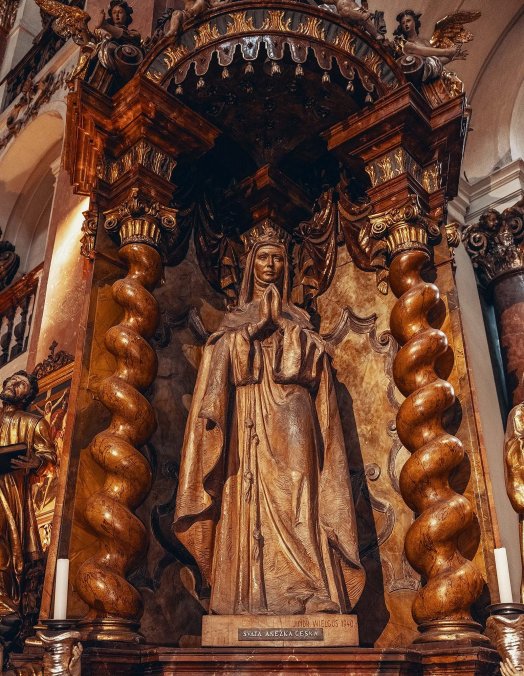
Martin Kumžák's cantata Saint Agnes is dedicated to the story of the saint, sister of Wenceslas I. The composition is a musical synthesis ranging from Gregorian chant to the present day, yet remains stylistically pure.
Capella da camera Praga is a renowned chamber ensemble under the artistic direction of Lukáš Verner. It is an ensemble based on the principal players of the Prague Symphony Orchestra and prominent musicians playing period instruments. The composer himself, Martin Kumžák, will conduct the performance. The cantata will be performed on the birthday of Agnes of Bohemia, January 21, 1211.
Why at the Minorite Monastery in Prague?
Just as Anežka and her brother Václav I stood together during their lives, there are two monasteries in Prague founded by these siblings. Both are inspired by Franciscan ideas, which is why the performance of ORATORIO OF SAINT ANEŽKA at the Minorite Monastery founded by Václav I is an exceptional event in an exceptional place. Mendicant orders first entered the Czech environment thanks to the efforts of Saint Agnes, who founded the Poor Clares monastery in František. With the Poor Clares, modern European culture also penetrated Prague – for example, Gothic architecture. An impressive statue of Saint Agnes can also be seen in the Basilica of Saint James.
Saint Agnes of Bohemia, known as the Czech, was born between 1205 and 1211 around January 21, on the feast day of Saint Agnes of Rome, after whom she was named, as a Czech princess, probably the youngest daughter of Czech King Přemysl Otakar I and Queen Constance of Hungary. She was one of the most important representatives of the Přemyslid dynasty and served as a nun – abbess of the Na Františku monastery. She became an important figure in political, cultural, and social life. Anežka was influenced in her ecclesiastical ambitions and charitable activities by her relatives: her aunt, the abbess of St. George's, Anežka, her cousin, St. Elizabeth of Hungary, and St. Hedwig of Silesia. In 1234, Agnes and her brother founded a new double monastery for women and men of the Order of St. Francis, later called the Poor Clares and the Minorites, on the northeastern edge of the then city, in a place later called "Na Františku". She personally supervised the construction and became the first superior of the Poor Clares. In 1237, she unsuccessfully attempted to establish her own order based on strict adherence to the rules of the Franciscan Order. In 1238, she renounced her position as abbess and her title, and the office remained vacant until her death. For the rest of her life, she allowed herself to be addressed as elder sister. Anežka Přemyslovna herself strove for personal and selfless holiness with humility and love in serving the sick, the poor, and her fellow sisters.
"The personality of Saint Agnes was and still is an admirable role model. She managed to fully achieve everything she set out to do, both spiritually and humanly. She did not follow what was expected of her, but followed her convictions without compromise. For me, that is what makes her story so extraordinary. In order to be able to say something publicly, to do something, to pass something on to other people, I must first immerse myself in myself and experience something. Agnes did a lot for the Přemyslid dynasty, for the Order of St. Clare, but above all, she came up with ideas that are still valuable 800 years after her death. And all this is reflected in the composition ORATORIUM SV. ANEŽKY," says Martin Kumžák.
Martin Kumžák is a multi-genre composer, arranger, conductor, and long-time sought-after keyboard player. He is best known to the public for his work on the show Stardance, where he performed regularly with his dance orchestra, the Moondance Orchestra. However, his range is much broader. As an instrumentalist, he has played in many rock, pop, and jazz bands (Milan Svoboda's Kontraband, the band Žáha). As a conductor and arranger, he has participated in Czech productions of the musicals Hair, West Side Story, Rusalka, and Pěna dní. He also participated in Janek Ledecký's musicals Hamlet and Galileo. In addition to the aforementioned Moondance Orchestra, Kumžák also leads another musical ensemble, the group Pajky Pajk, which primarily accompanies the singer Dasha at her concerts. He also collaborates with the Epoque Quartet and does not mind their genre diversity at all. He embraces stylistic diversity and also composes classical music, to which he has a warm relationship. Among other things, he is the author of the opera "The Divine Comedy," which was performed by the Prague State Opera in 2002. He has also written a number of chamber and orchestral compositions (e.g., a suite for violin, cello, and piano, Šroubovice for string quartet and orchestra, and the ballet oratorio Zvěrokruh). He has long collaborated with the Prague Symphony Orchestra, which performed his oratorio "Svatý Václav" (St. Wenceslas), for which he won the 2015 OSA Award in the Classical Composition of the Year category, as well as his composition "Sherlock Holmes" (2017) and the cantata-oratorio "Svatá Anežka" (St. Agnes) (2019).
CAST:
MARTIN KUMŽÁK – composer and conductor
Michaela Šrůmová - soprano
Miloš Horák - bass
Capella da camera Praga – Lukáš Verner, artistic director
Also featured in the program:
Helena Jiříkovská - violin
Richard Šeda - cink
Jan Hoďánek - oboe
Jaroslav Matějka -cello
Přemysl Vacek - theorbo
Tomáš Reindl - percussion
Lukáš Verner - double bass
 English
English
 Čeština
Čeština